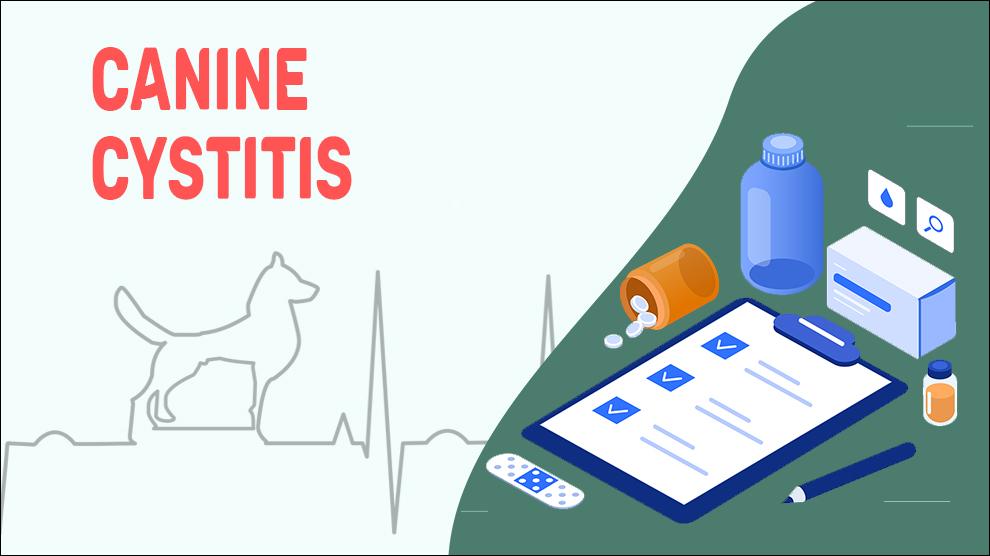What is Canine Cystitis In Dogs?
The term "cystitis", by definition, means inflammation of the lining of the urinary bladder. This generalized term is applicable to any disease that inflames the urinary bladder.
Although not typically serious, cystitis can be very stressful for your dog. There are several causes of cystitis that vary significantly between dogs as well as males and females. Bacterial infection is the most common cause of cystitis in dogs with 14% of all dogs acquiring bacterial cystitis in their lifetime.
When an infection is not the cause of bladder inflammation, it’s called idiopathic or interstitial cystitis (also called sterile cystitis).
Both canine cystitis and interstitial cystitis symptoms are almost similar. For this reason, it’s really tricky to establish the cause of bladder inflammation without a veterinary diagnosis.
Symptoms Of Canine Cystitis In Dogs
- Pollakiuria- Increased frequency of urination
- Hematuria or blood in the urine
- Discomfort while urinating
- Overactive bladder
- Straining (dysuria), whimpering and squatting for little urine
- Dark/ reddish cloudy urine
- Strong stinky urine
- Inappropriate urination/Dripping little spots of urine
- Other signs of systemic infection (such as fever, loss of appetite, or lethargy);
Treatment Options For Canine Cystitis In Dogs
Treatment depends on the cause.
The use of urinalysis and urine culture will allow us to find out the most appropriate and effective antibiotic.
Bacterial cystitis is generally treated with a broad-spectrum antibiotic. All the dosage information is anecdotal.
Amoxicillin - Amoxi - Tabs, Amoxil, Bimox, Novamoxin, Moxatag (10 - 20 mg/kg, bid/tid, per os), Or, antibiotic combo (Amoxicillin/Clavulanate).
Cefadroxil - Cefa - Tabs, Duricef or Cefa - Drops (22 - 30 mg/kg - bid).
Cefpodoxime - Simplicef and Vantin, FDA approved for dogs only (5 - 10 mg/kg/day).
Ormetoprim-sulfadimethoxine - PRIMOR (27.5 - 55 mg/kg, PO, first day - then 13.5 mg/kg/day, PO).
Cefovecin - convenia (3.6 mg/lb or 8 mg/kg, SC).
Bladder Stones:
- Surgical removal - Cystotomy.
- Non-surgical removal - Urohydropropulsion (special catheter with a saline solution flushed through the bladder to expel the stones).
- Dietary dissolution: There are different types of bladder stones, while a change in diet cannot address all of them but few of them will.
Bladder Cancer: Surgery, chemotherapy, radiation, or a combination of these treatments.
Benign bladder polyps are usually surgically removed.
Home Remedies For Canine Cystitis In Dogs
If your dog is not a big fan of water, encourage water intake by placing water bowls, a water fountains nearby, adding flavor to water (bone broth or chicken broth), or adding wet food to his food ration.
Quick Tip: The recommended fluid intake for dogs on a dry food diet is:
Body weight (1 lb) - 30ML of water.
This means a 20 -25 kg dog should be drinking 1.5 L of water/ day.
How to Prevent Canine Cystitis In Dogs
Make sure to provide free and unrestricted access to water. This will reduce the risk of cystitis developing, but cannot entirely prevent it.
The use of a special Urinary diet for dogs that have a history of developing crystals or stones will reduce the chance of Cystitis formation.
For long-haired dogs - a Bikini Wax Dog Style to clip short the hairs in hindquarters and this prevents fur around the vulva heavily soiled when the girl dog sits down.
Offer regular toilet trips to your dog, so that there will not be a stagnant pool of urine as she empties her bladder often.
Affected Dog Breeds Of Canine Cystitis
There is no breed disposition. Female dogs are at a much higher risk of infection.
Additional Facts For Canine Cystitis In Dogs
Interstitial and non-interstitial present similar symptoms.
Canine Cystitis is usually caused by bacterial infections or other infections.
Interstitial cystitis has many possible causes that include:
- Bladder stones in the urinary tract.
- Parasites in the urinary tract.
- Pelvic injury/ Trauma to the bladder.
- Inflammation in the urogenital tract.
- Cancer in the urogenital tract.
- Congenital - urinary tract abnormalities present at birth.
- Side effects to medications or mistreating urinary tract infections.
- Secondary to kidney disease, diabetes, or Cushing’s disease.
- Neurological disorders causing retention of urine.
When To See A Vet For Canine Cystitis In Dogs?
The dog may be as asymptomatic or show fewer signs or it may be very obvious, depending on the severity and the specific dog.
It is abnormal for cystitis to manifest signs of systemic infection (such as fever or lethargy); when this happens, it means a more serious condition (such as bladder cancer) is prowling inside.
When your dog is unable to pass urine or feels immense pain when doing so - this is an emergency and needs an IMMEDIATE visit to the vet clinic.
Dog Food Suggestions For Canine Cystitis
- Avoid DRY FOOD, Spicy foods, Greasy, fatty, and fried foods.
- Commercial foods should have high-quality, natural ingredients, with no artificial additives.
- eliminate colorings, Allergens (gluten, soy and dairy), preservatives, additives and flavors from your pet’s die
- Nutritionally balanced, fresh, natural raw diet or home-cooked diet with raw protein.
- Raw meat or Boiled boneless, skinless chicken breast meat.
- Underground vegetables, Pureed pumpkin.
- Fresh vegetables/fruit (green beans, carrots, banana, apple, orange).
- fish: Salmon, sardines, mackerel, tuna.
- High-moisture diet: high hydration levels to flush the kidneys and ureters.
- Increase water intake or install a pet water fountain.
- Supplement prebiotics and probiotics formulated for pets.
Conclusion
In addition to a well-balanced diet, make sure your dog always stays hydrated, so they can flush out the bladder consistently.
Complete prevention of cystitis is not possible, but early identification may allow your veterinarian to regulate your dog's medications or diet before your dog requires surgery.

















